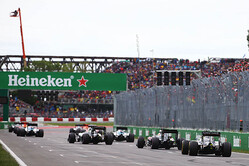


14/06/2016
NEWS STORY
 Eurocare, an alliance of non-governmental and public health organisations has publicly questioned Heineken's £173m F1 deal.
Eurocare, an alliance of non-governmental and public health organisations has publicly questioned Heineken's £173m F1 deal.
The deal, which, following months of speculation, was confirmed on Friday in Montreal, will see the Dutch beer as title sponsors of three Grands Prix, beginning with the Italian event at Monza in September, along with a "significant presence" at several additional events chosen by the brewer and FOM.
Heineken will also be the exclusive "Global Beer Partner" of Formula 1 and will also have substantial pouring, activation and access rights across the majority of events in the World Championship, though the brewer insists that Heineken branding will not be visible on any F1 cars.
The deal, which runs for seven years - with a break clause after 2020, comes at a time Eurocare (The European Alcohol Policy Alliance) is already seeking to have alcohol sponsorship in F1 banned, much like happened with tobacco, and it is no surprise that the lobbying group was quick to voice its concern at the deal.
"Heineken recently launched their new sponsorship agreements with F1, a five-year deal estimated to be worth $150m," said Eurocare in a press release entitled 'Formula One puts Heineken in the driving seat'.
"With this new deal, Heineken will place themselves as one of the main sponsors of the sport, with both trackside billboards, branded name of the events and other promotional activities.
"Alcohol brands are now dominating sponsorships in F1, linking a popular motor sport to a significant cause of avoidable physical, mental and social harm and more specifically one of the major killers on our roads, drink driving."
"F1 should ask themselves if they want to be a motorsport or an alcohol brand event," said Eurocare Secretary General, Mariann Skar, who has also written an open letter to FIA president, Jean Todt (below).
"When monitoring F1 in Monaco 2015, we found 11 references to alcohol brands per minute, averaging one reference every five seconds. How will it be when Heineken comes in as main sponsor in addition to the others? If both the sport and the drinks producers want to be seen as responsible industries, they should stop this deal and move away from alcohol sponsorship in F1".
"Drink driving is one of the key killers on the road alongside speeding," added Eurocare. "The United Nations' new Sustainable Development Goals aims to halve the number of global deaths and injuries from road traffic accidents in their target 3.6.
"The principles not to link alcohol brands and driving are clearly established in both the EU regulation for advertising (Audio-Visual Media Services Directive) and in the drinks industry's own codes.
"It is surprising that both F1 management and Heineken chose to interpret their sponsorship practice as something other than advertising.
We are, therefore, asking for stronger legislation, both from the European Commission and from individual Member States, who should follow France's example of banning alcohol sponsorship of sport events."
Other than the Heineken deal, a number of teams are sponsored by alcohol brands, not least Williams which sports Martini branding.
In her open letter to Jean Todt, Mariann Skar writes:
"Heineken recently launched their new sponsorship agreements with F1, a five year deal estimated to be worth $150 m. With this new deal, Heineken will place themselves as one of the main sponsors of the sport, with event name and circuit branding, TV commercials and other promotional activities. This is a major concern because alcohol and driving should not be mixed. Alcohol brands are now dominating sponsorships in F1, linking a popular motor sport to one of the major killers on our roads, drink driving.
Alcohol marketing has a powerful effect on society, in particular on young people. As you very well know, F1 is a sport heavily sponsored by alcohol producers, even before this new deal. A report on alcohol brand exposure during the F1 Monaco Grand Prix last year showed that there were on average 11 references to alcohol brands per minute – averaging one every five seconds. The promotion of alcohol alongside iconic sporting events reinforces and exaggerates pro-alcohol social norms. The Monaco Grand Prix has a worldwide audience of around 500 million people, and with the new deal in addition to the previous sponsorship agreement, F1 is close to becoming more an event for granting the global exposure of alcohol brands than a sporting event.
We have previously written to you about this concern, and in your response you declare yours and FIA's commitment to road safety, referring to your work with the 'Action for Road Safety' programme, in addition to yourself being a UN Special Envoy for Road Safety. We would like to remind you that drink driving is one of the key killers on the road. It is therefore worrying that F1 is now bringing the link between alcohol brands and motor sport even closer together.
We would like to request that you take this issue seriously and consider moving away from these sponsorship agreements, as you did with tobacco sponsorship. FIA is not without responsibilities, being the governing body of F1 and also being one of the shareholders in the sport."